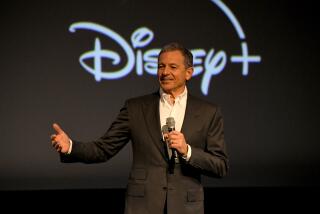Company Town : Ex-Ally Jumps on Eisner as Overpaid
- Share via
For years, Bud Crystal has steadfastly defended the spectacular compensation arrangement that has reaped Walt Disney Co. Chairman Michael D. Eisner hundreds of millions of dollars for leading the entertainment giant’s decade-long turnaround.
Probably the nation’s best-known expert in executive pay, Crystal had good reason. As a former consultant to Disney’s board of directors, Crystal helped design the very packages that have made Eisner by far the best-paid chief executive in the nation.
While the rest of the world viewed Eisner’s compensation as Fantasyland, Crystal was ever the contrarian, arguing in his monthly newsletter two years ago that the reason Eisner made so much money “was because he stepped up to the plate and, in a manner reminiscent of Robert Redford in ‘The Natural,’ knocked out the lights.”
Now comes a development already causing anxiety at Team Disney headquarters in Burbank. Crystal is about to drastically change his tune with a study to be released Dec. 1 on the performance and pay of 350 chief executives of some of the nation’s largest firms. The conclusion: Eisner was the most overpaid CEO in the nation the last three years.
Even factoring in Disney’ size and above-average performance in that period, Crystal concludes, Eisner “earned a great deal more than he should have earned” in the period, an amount Crystal calculates at $377.3 million in pay, bonuses, gains on stock options exercised and gains on options Eisner has yet to exercise.
“It’s very hard to find the justification for this level of pay,” Crystal said in an interview.
Needless to say, Disney executives and directors view Crystal’s turnaround as an act of betrayal and are quick to defend Eisner, whose contract calls for a relatively small annual base salary of $750,000, but rewards him generously if he’s successful.
*
“When it finally comes down to it, Michael Eisner--and I think shareholders would agree--is worth every penny he’s gotten. God bless anybody else who is willing to take that risk and who does that kind of job for the enterprise,” said Disney director Raymond Watson, a member of the board’s compensation committee.
Disney is also unhappy at the prospect of Eisner’s compensation again becoming a public issue, as it did in late 1992 when he reaped a whopping $202 million in one day by exercising long-held stock options.
The report comes at a sensitive time for Disney. This year alone, the company suffered the loss of President Frank G. Wells in a helicopter crash, the resignation of studio chief Jeffrey Katzenberg and an embarrassing defeat in its bid to build a historic theme park in Virginia. Eisner also underwent emergency quadruple bypass surgery.
On a positive note, Disney is expected next week to bounce back from a weak 1993 fiscal year--caused largely by losses at the ailing Euro Disney theme park. Analysts are projecting record earnings of more than $1 billion, thanks to such hits as “The Lion King” and the video version of “Aladdin.” Those results are likely to trigger another bonus for Eisner.
Eisner declined to comment on Crystal’s report. But Watson and other Disney officials vehemently argue that any three-year analysis of Eisner’s performance and pay is misleading.
The compensation rewards Eisner for work done since his hiring in 1984, they argue. That involved leading a turnaround that not only saved the company from the grips of corporate raiders such as Saul Steinberg, but also boosted the company’s market value from $2 billion to $22 billion, they contend.
They also note that Crystal’s analysis is skewed by the $202-million gain in late 1992.
Eisner earned that compensation over the previous eight years since 1984, they argue, adding that the options would not have been worth the paper they were written on if Eisner and *
Crystal’s study isn’t likely to change anything--it’s merely a numbers-crunching exercise to provoke continuing debate over the volatile issue of executive pay.
According to Crystal, a company with Disney’s size and performance would pay a CEO about $18.4 million over that three-year period, far less than the $377.3 million Eisner got.
Crystal says his system is flexible. It’s reasonable, he says, to factor in other variables--such as the level of compensation in Hollywood overall and the risk Eisner takes--to make a case that he should have earned $100 million. Still, it’s not close to the actual gains, he says.
Crystal says part of the reason Eisner shows up in the rankings where he does is because his overall performance was dragged down to an average level by Euro Disney. For the nine years between 1984 and 1993, he says, Eisner ranks at the 98th percentile among CEOs.
For his part, Crystal says he doesn’t want to be seen as picking on Eisner, who he says has always played by the rules when it comes to compensation. Crystal said Eisner also shouldn’t be grouped with executives who enjoy more egregious pay structures, such as those who take home hefty paychecks for producing mediocre results.
“If you hit out the lights and make $377 million, it’s a lesser sin than grounding out and making $150 million,” Crystal said. “It’s just that it would have been nice if Michael would have been paid less.”
*
Inside Hollywood
* For more Company Town coverage and insightful analysis of the entertainment industry, sign on to the TimesLink on-line service and “jump” to keyword “Inside Hollywood.”
Details on Times electronic services, B4
More to Read
Inside the business of entertainment
The Wide Shot brings you news, analysis and insights on everything from streaming wars to production — and what it all means for the future.
You may occasionally receive promotional content from the Los Angeles Times.










